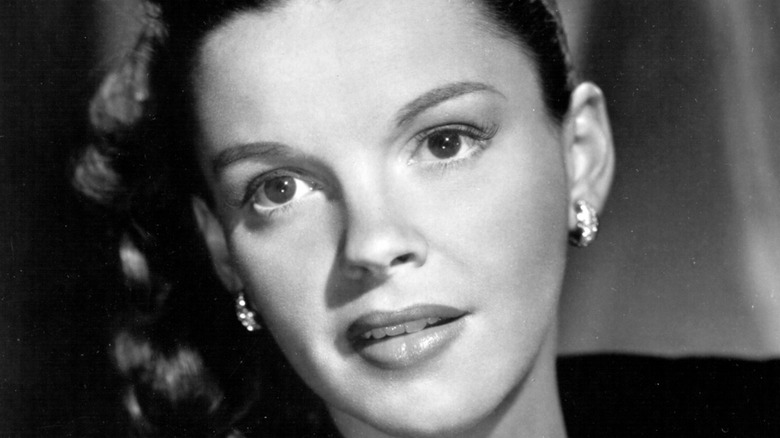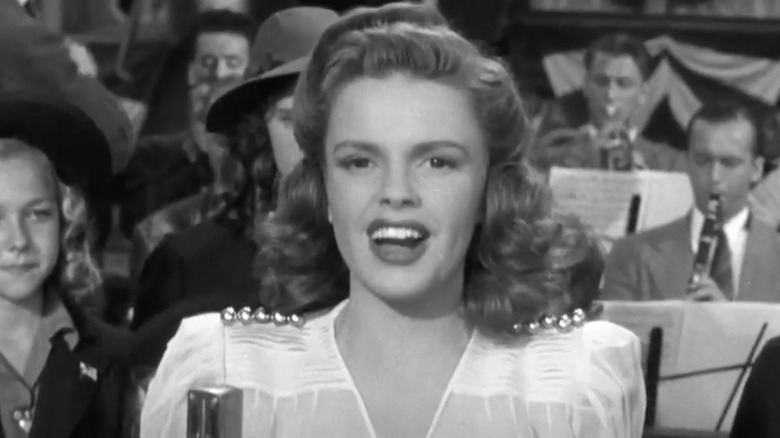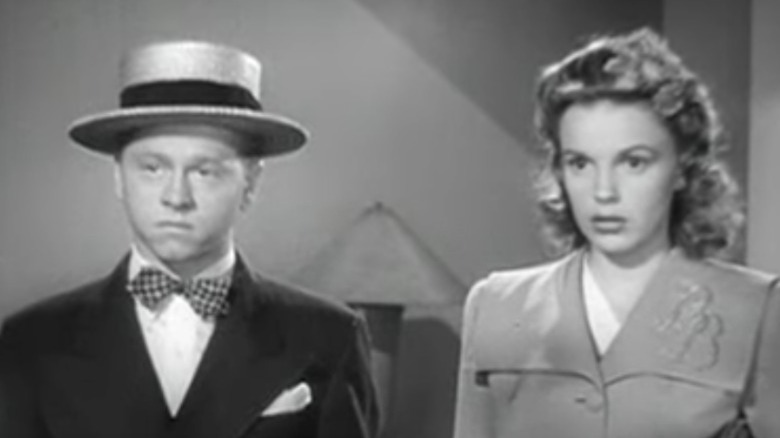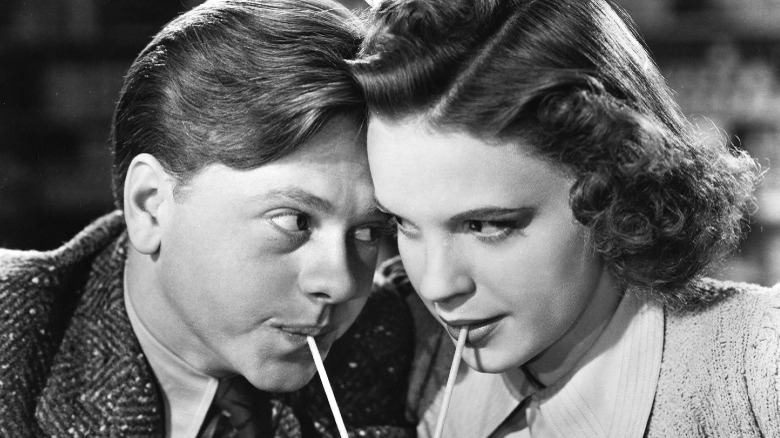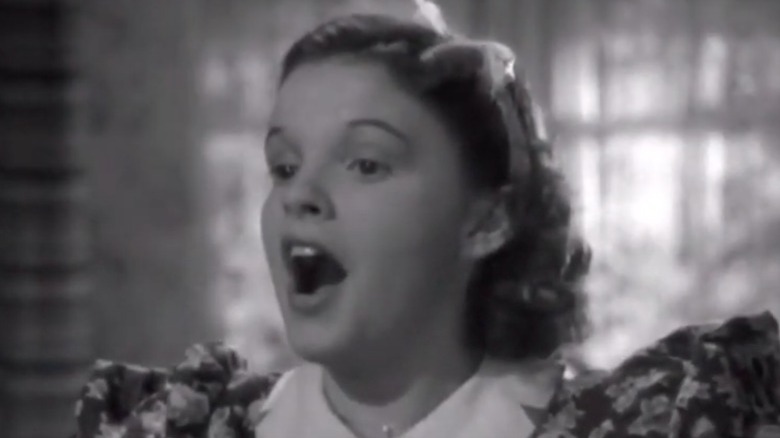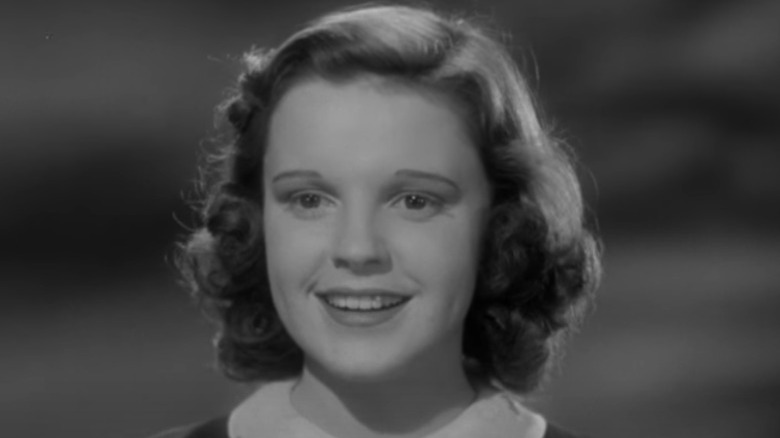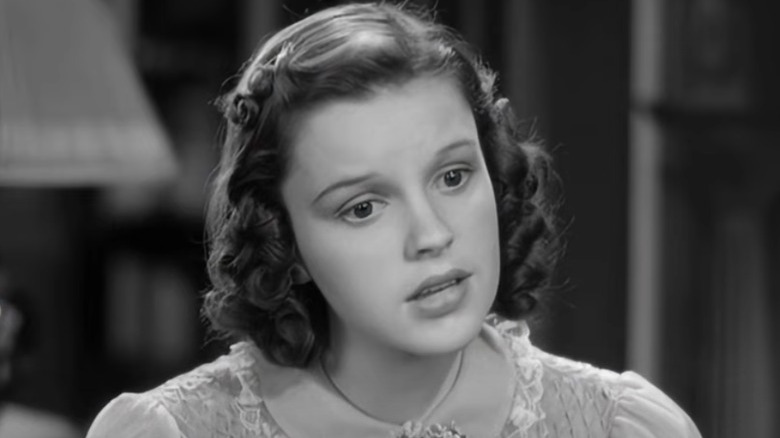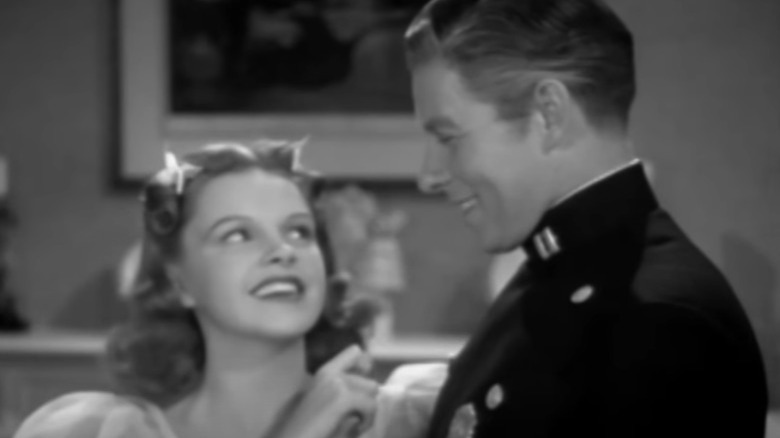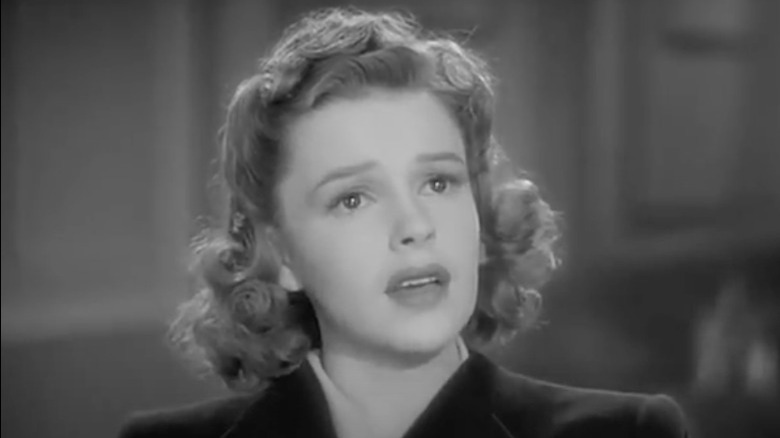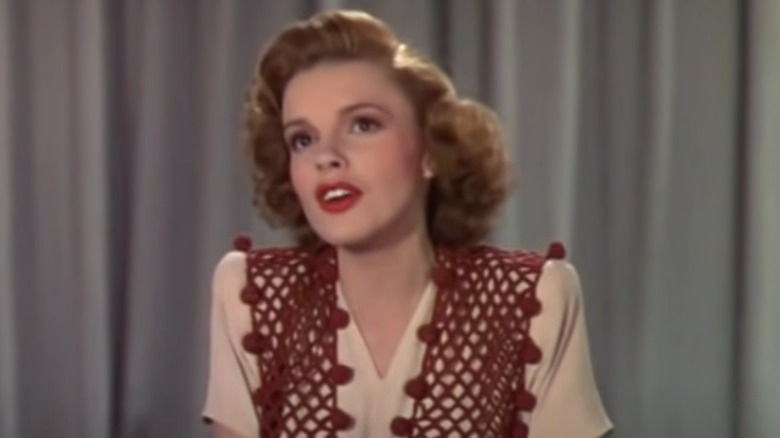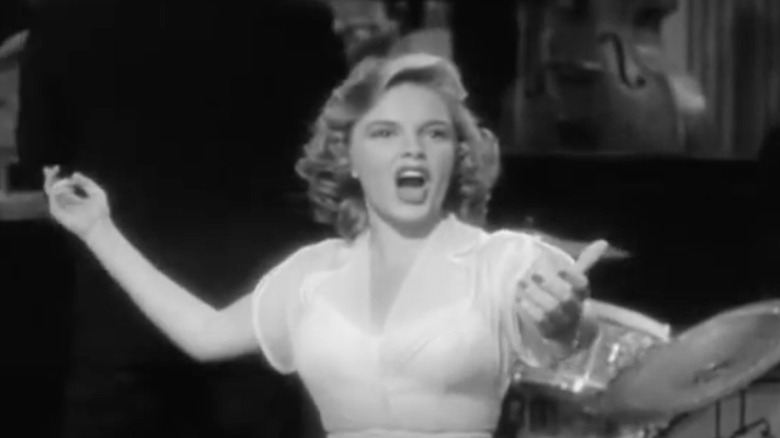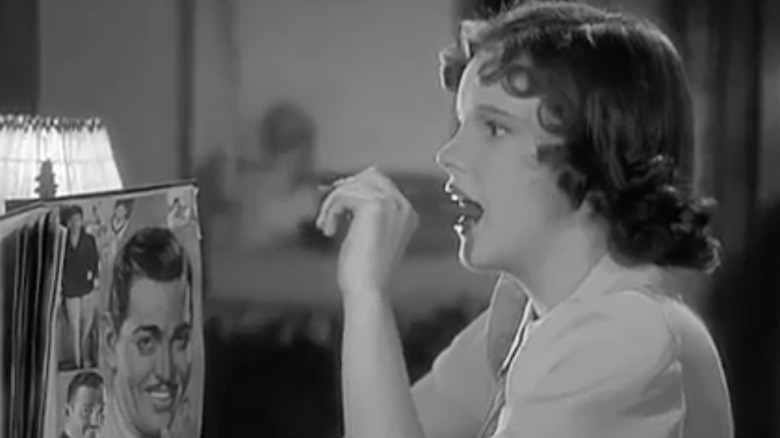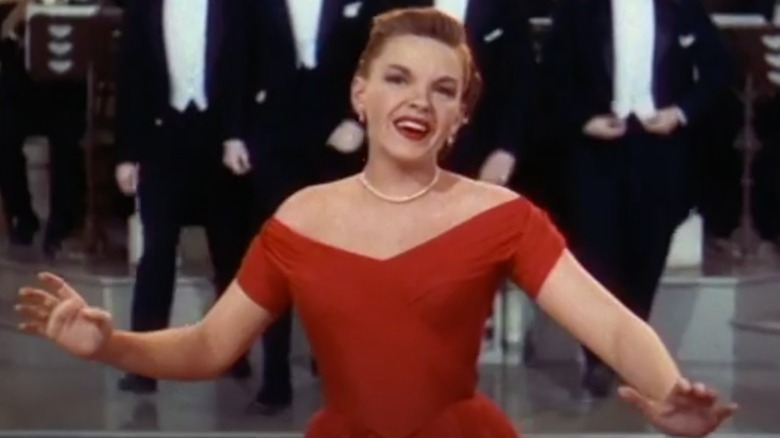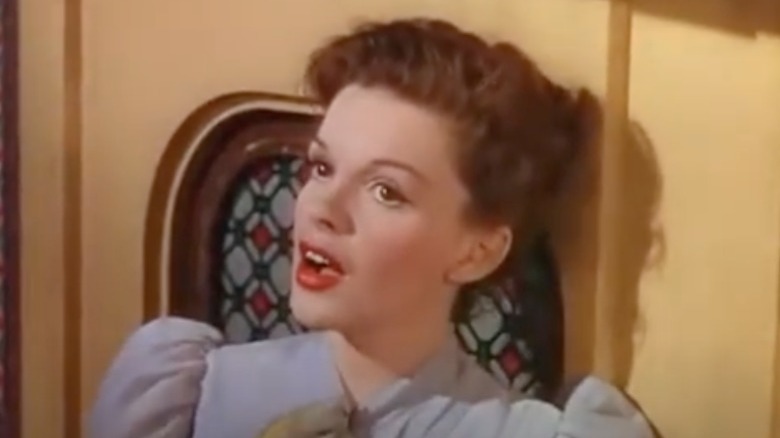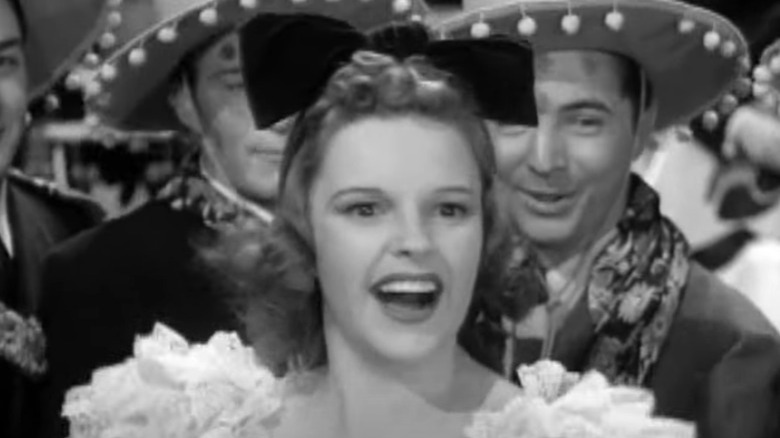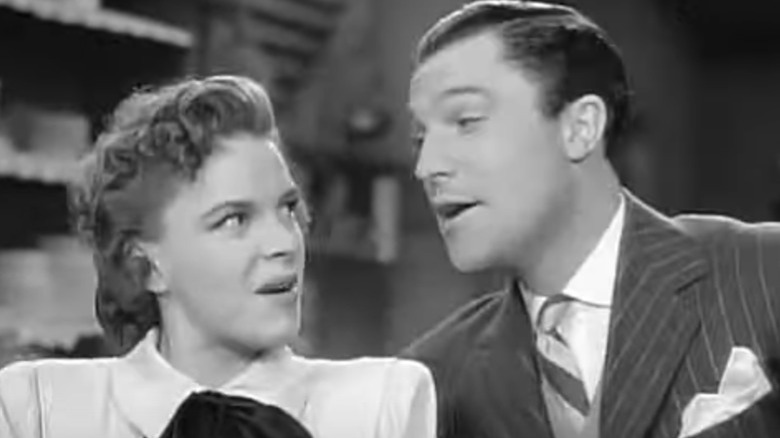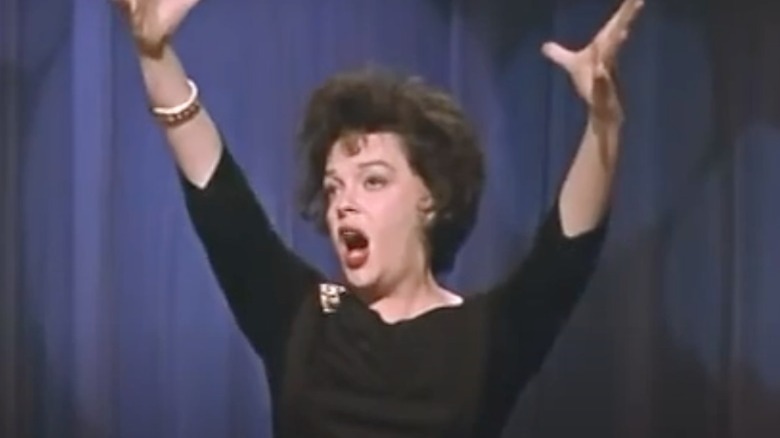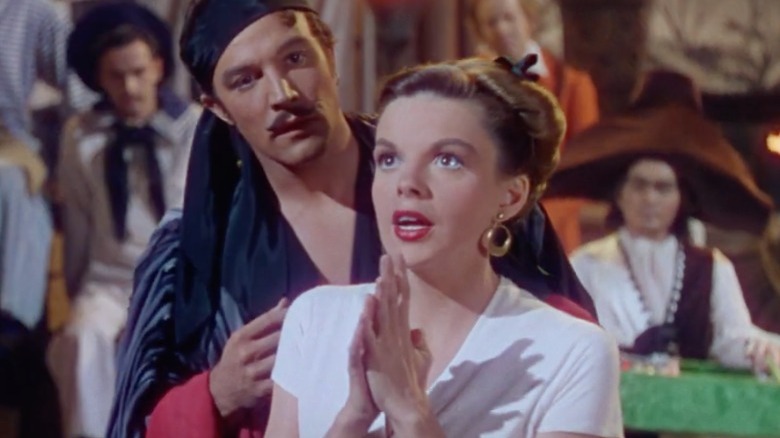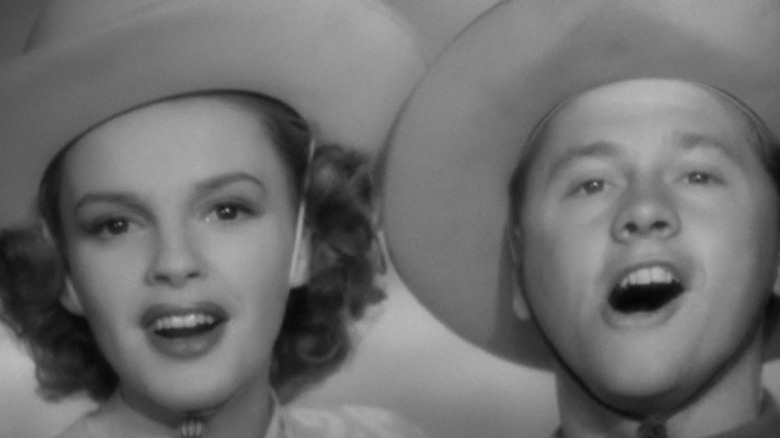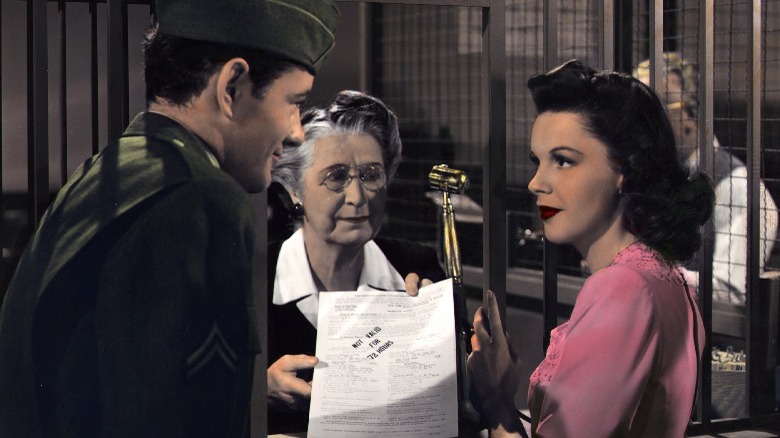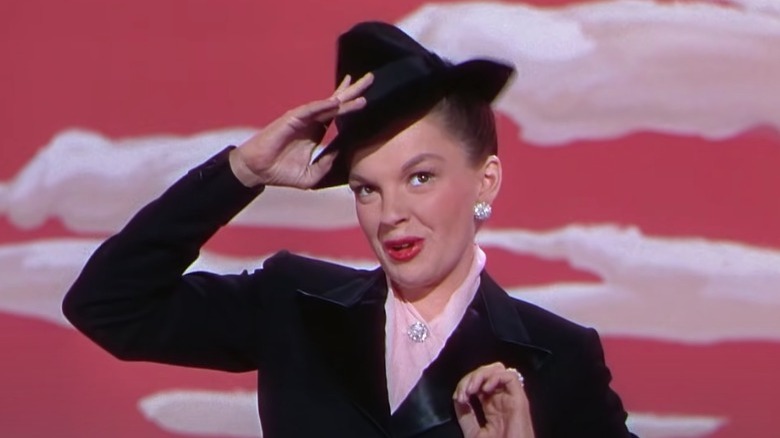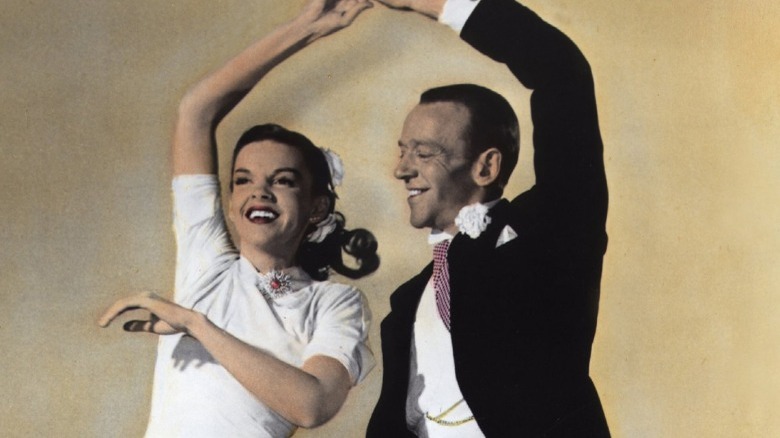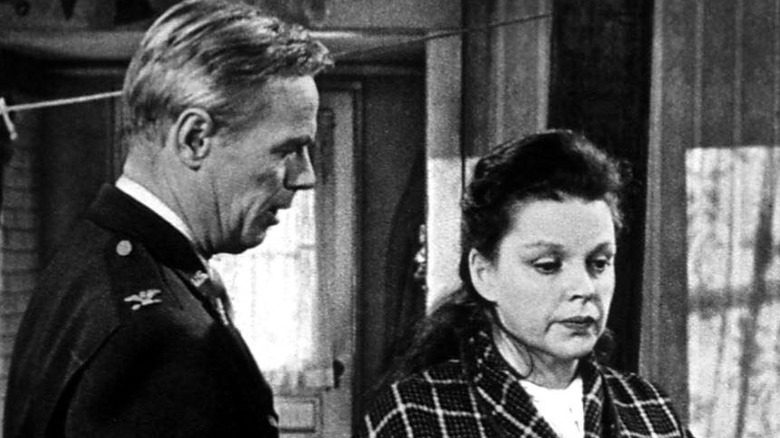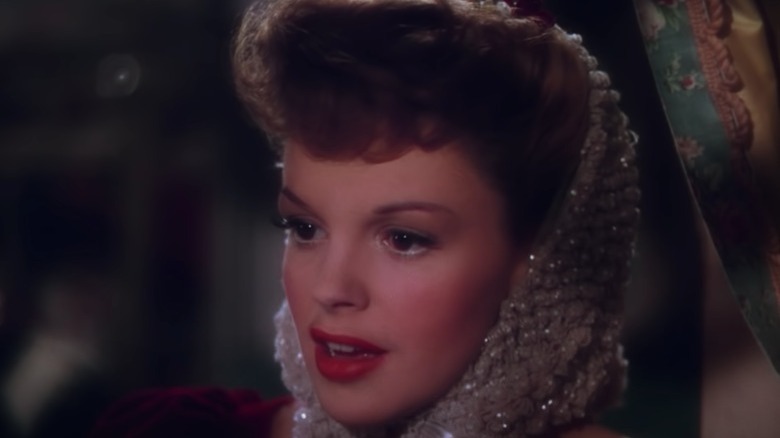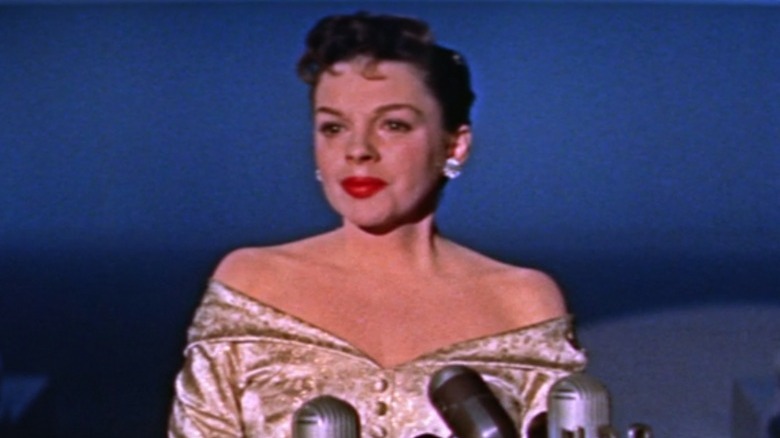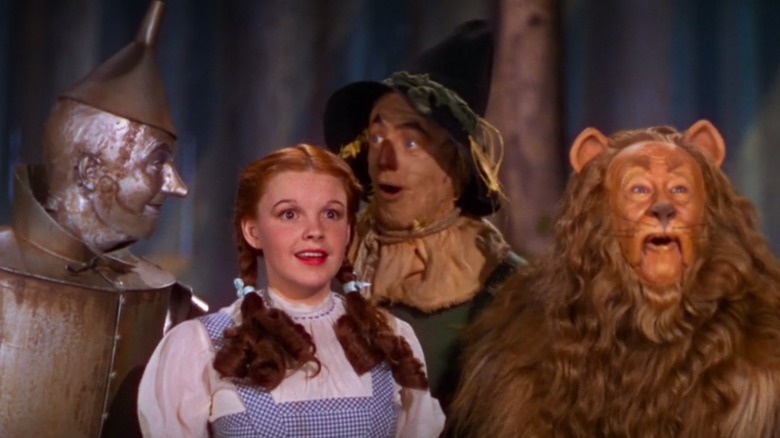25 Greatest Judy Garland Movies Ranked Worst To Best
Judy Garland is the quintessential musical movie star of the 20th century. From her humble beginnings as child star Frances Gumm on the vaudeville stage to her ascent as one of the world's most celebrated film actresses, Garland enchanted audiences for decades with a stunning voice that could evoke the range of human emotions in just a few notes. As much as Garland is celebrated for her talents, she is also lauded as an icon for her endurance in the midst of personal tragedy and turmoil.
Garland died in 1969 at the age of 47, leaving behind a decades-long legacy of entertainment excellence. In her short life, she made over 30 films, each a testament to her unmistakable talents. Some of Garland's films like "The Wizard of Oz" remain vital pop culture touchstones, but for every "Oz" there is an equally delightful movie like "Summer Stock" that has been sadly overlooked throughout the decades. Even someone as iconic as Garland has a few turkeys to her credit, films that are best left to the past. So we're off to take a rousing jaunt through some of Judy Garland's great movie achievements, because of all the wonderful things she's done.
25. Babes on Broadway
Judy Garland and Mickey Rooney are putting on a show in "Babes On Broadway," which was actually their third opportunity to produce a "backyard musical." In "Babes On Broadway," Penny (Garland) and Tommy (Rooney) lead yet another group of rambunctious youth with showbiz aspirations to put on a show, this time as a benefit for orphaned children. Penny, Tommy, and their cohort of child stars successfully stage performances that give them the attention they so desperately desire.
By the film's release in 1941, both Garland and Rooney were notably long-in-the-tooth to realistically play young Broadway hopefuls, with both stars involved in real-life mature relationships (via TCM). "Babes On Broadway" also features an egregiously offensive finale sequence, with the troupe performing a minstrel show in blackface as they sing a medley of early 20th century popular songs. This is a film that's firmly a historical artifact. Enjoy Garland's renditions of songs like "How About You?" but leave most of "Babes On Broadway" for the historical dustbin.
24. Life Begins for Andy Hardy
"Life Begins for Andy Hardy," marks the end of Judy Garland's association with the Hardy film series. Launching Mickey Rooney's beloved Andy Hardy character into the adult gauntlet, "Life Begins for Andy Hardy" raises the stakes by taking him to New York City. Of course, he's not without the guidance of his friend Betsy Booth (Garland), who helps Andy find a job. Big city life is not as easy as Andy anticipates, but it does come with an expense account. However, juggling work, friendship, and his love life proves difficult for Andy and he gets some hearty life lessons along the way.
Garland's Betsy supports Andy as he fumbles his way through early adulthood. With not much to do but stand by and help, it's clear why Garland's participation in the film series stopped after "Life Begins for Andy Hardy." By 1941, Garland had leading-star status in Hollywood, so the need to play second-fiddle to Rooney's Hardy, if just for the exposure, was done. If you can't get enough of Garland and Rooney and you've exhausted their filmography, finish your journey with "Life Begins for Andy Hardy."
23. Babes In Arms
The first in Judy Garland and Mickey Rooney's "let's put on a show" series of films, 1939's "Babes In Arms" has a ragtag group of kids who show up their elders by becoming stage performers. When vaudeville performers Joe (Charles Winninger) and Florrie (Grace Hayes) hit the road without their songwriting son Mickey (Rooney) because they think he's too young, Mickey rebels by staging his own show. With help from his sweetheart Patsy (Garland) and other stage children, Mickey scrapes together a show that will keep the showbiz kids not only on stage, but in their homes.
"Babes In Arms" was released mere months after Garland's blockbuster film, "The Wizard of Oz." Garland delivers a plucky performance as Patsy, giving audiences of the time a mature contemporary contrast to her fantastical portrayal of Dorothy Gale in "Oz." 1939 was such a pivotal year for Garland that she garnered a special juvenile Oscar for her collective works. As much as Garland was celebrated for "Babes In Arms," the movie itself is a relic. Parts of the film, including Rooney and Garland performing in blackface, are painful to watch, making "Babes In Arms" recommended viewing only for Judy Garland completists.
22. Thoroughbreds Don't Cry
"Thoroughbreds Don't Cry" is Judy Garland and Mickey Rooney's first on-screen pairing, launching a 10-film partnership that would span over a decade. However, this 1937 movie was not made as a Garland-Rooney vehicle, but was rather meant for Rooney and fellow MGM child star Freddie Bartholomew (a role that eventually went to actor Ronald Sinclair). According to TCM, the studio wanted to feature Garland and added the role of Cricket especially for her. O course the role was designed to showcase Garland's vocals, giving her opportunities to sing songs like "Got A Pair Of New Shoes" to her male co-stars.
The film itself is fairly inconsequential, following young jockey Timmie Donovan (Rooney) as he rides Roger Calverton's (Sinclair) horse to victory on the racetrack, but not without trouble from his conniving dad. "Thoroughbreds Don't Cry" is the type of movie that populated the airwaves as a rerun in the early days of television. A historical footnote in Garland's career, there are plenty of other Garland movies that run circles around this equine novelty.
21. Listen, Darling
Probably most notable for being Judy Garland's last movie before the release of "The Wizard of Oz," 1938's "Listen, Darling" is a slight confection about two young children playing matchmakers for the adults in their lives. Widowed and single, Dottie (Mary Astor) is looking for stability by pursuing an emotionless relationship with a local banker. Her daughter Pinkie (Garland), with the help of Pinky's friend Buzz (Freddie Bartholomew), steals Dottie away so that she doesn't end up with the banker. Pinky and Buzz find two suitable suitors for Dottie, hoping she will fall in love.
"Listen, Darling," while trivial at best, does have a shining Garland musical performance. Even when initially released, critics observed that the movie had little to offer other than "three good song numbers handled capably by Garland" (via Variety). Her most notable song is "Zing! Went The Strings Of My Heart," a number that would remain in Garland's repertoire for decades. Watching Garland perform this song is a fun glimpse into her early artistry.
20. Love Finds Andy Hardy
In "Love Finds Andy Hardy," Judy Garland plays Andy Hardy's (Mickey Rooney) pal Betsy Booth in the first of her three appearances in the Hardy family film franchise. Andy is keen on cars and his girl Polly Benedict (Ann Rutherford), but not so much on young Betsy, who harbors an unreciprocated crush on him. Andy finds himself in a series of dilemmas centered around vehicle ownership, girls, and the Christmas Eve dance.
The Andy Hardy films portrayed a whimsical slice of Americana, and "Love Finds Andy Hardy" serves up lighthearted life lessons with aplomb. MGM used the Hardy films as a showcase for emerging female talents and this film is no exception, featuring Lana Turner as Cynthia (via TCM). While Garland plays a supporting role in "Love Finds Andy Hardy," she manages to get in some songs, including "In Between," "Meet The Beat of My Heart," and "It Never Rains But It Pours." A star vehicle for Rooney, the movie is a serviceable example of his and Garland's chemistry.
19. Little Nellie Kelly
In "Little Nellie Kelly," Judy Garland plays two roles, that of Nellie Noonan Kelly and her daughter, Little Nellie Kelly. A project especially conceived to transition Garland from child actor to mature leading lady, "Little Nellie Kelly" trails the Kelly family as they make their way from Ireland to the United States. Notably, "Little Nellie Kelly" contains Garland's only on-screen death, with her performance so impactful that co-star George Murphy reportedly said that no one was left on the set after she filmed the scene, lest their sobbing spoil the shot (via TCM).
Critics were harsh with "Little Nellie Kelly," with the New York Times saying the movie, upon its holiday 1940 release, was "passing fair, and hardly the sort of picture to send folks dancing with Christmas cheer in the streets." But as with even the most tepidly received Garland movie, her song performances transcend any cinematic mediocrity. Garland's bouncy version of "Singin' In The Rain" and "It's A Great Day To Be Irish" are notable sonic highlights from "Little Nellie Kelly." Not too bad for a clearly transitional film in Garland's career.
18. Ziegfeld Girl
Judy Garland stars alongside Lana Turner and Hedy Lamarr in 1941's "Ziegfeld Girl," a story about a trio of aspiring performers in the heralded "Ziegfeld Follies" Broadway revue of the early 20th century. Garland plays Susan, a singer with a vaudeville background, whose amazing voice lands her a coveted role as a Ziegfeld girl. She might not have the conventional beauty of her cohorts Sandra (Lamarr) and Sheila (Turner), but she makes up for it with her astounding vocal prowess, belting out songs like "I'm Always Chasing Rainbows" and "You Never Looked So Beautiful."
"Ziegfeld Girl" doesn't know quite what to do with Garland's tremendous talent, failing to position her alongside Turner and Lamarr as one of cinema's great charismatic screen presences. However, it's ultimately Susan who rises through the ranks and becomes the true star, her success achieved almost in spite of her looks. "Ziegfeld Girl" is a notable stop on Garland's film resume, if only to see her mingle with other iconic MGM stars.
17. Thousands Cheer
Before YouTube, MTV, and quite frankly, even before television, there was an audience for bite-sized performances without having to sit through an entire show or movie. "Thousands Cheer" is such a film and Judy Garland is but one of many stars delivering standout performances in this movie meant to lift morale during World War II. The film has a plot, following Private Eddie Marsh (Gene Kelly) as he navigates military service while falling for officer's daughter Kathryn (Kathryn Grayson). But the real fun of "Thousands Cheer" comes from the movie's subplot about putting on a show for the troops featuring MGM's top stars.
By the film's release in 1943, Garland was one of the studio's big talents, so naturally she is a featured performer. Accompanied by conductor José Iturbi on piano, Garland sings "The Joint Is Really Jumpin' In Carnegie Hall" with a full-tilt boogie-woogie swing. "Thousands Cheer" also features performances by Lena Horne, Red Skelton, and the United Nations Chorus, making it a true cavalcade of early 1940s entertainment. Come for Judy Garland, but stay for Gene Kelly dancing with a mop.
16. Presenting Lily Mars
Judy Garland breaks out of her child-star persona and into glamour-goddess mode in the movie "Presenting Lily Mars." When the movie was released in 1943, MGM positioned Garland (via YouTube) as "a new star in the heavens — young, fresh, beautiful," comparing her to the studio's mature actresses like Hedy Lamarr, Greta Garbo, and Joan Crawford. The film's story reads like a literal instructional pamphlet to viewers, forcing audiences to perceive Garland as a young adult.
In "Presenting Lily Mars," Garland plays the title role, a provincial young woman seeking Broadway stardom. Garland's aesthetic indeed gets a mature upgrade from previous films, complete with a curly, side-parted bob and flowing gowns, a far cry from the pigtail-and-gingham look of her "Wizard of Oz" days. She performs a number of songs in "Presenting Lily Mars," including a smashing rendition of "Broadway Rhythm," accompanied by Tommy Dorsey and his Orchestra. Not especially loved by critics, "Presenting Lily Mars" is nevertheless a fine vehicle in which Garland shows she's ready for adult stardom.
15. Broadway Melody of 1938
One of Judy Garland's pre-"Wizard of Oz" film appearances is in the 1937 musical extravaganza "Broadway Melody of 1938." The movie stars tap-dancing legend Eleanor Powell as a horse trainer with a gift for song and dance who inadvertently gets discovered by agent Steve Raleigh (Robert Taylor). Garland leads the subplot of the film, playing aspiring young performer Betty Clayton, who is looking for her big break with the help of Alice (Sophie Tucker). Musical stalwarts Buddy Ebsen and George Murphy lend their talents to the film as well, providing ample opportunities for breakout song and dance numbers.
"Broadway Melody of 1938" gives Garland a chance to showcase her formidable talents. She sings, dances, and even longs for then-movie superstar Clark Gable. Her signature song from the film is "You Made Me Love You (I Didn't Want To Do It)," modified with lyrics that have Garland's Betty pine away for her favorite matinee idol. It was this "Dear Mr. Gable" version of the song that actually landed Garland a role in this movie. She had performed the song at Gable's birthday party and so impressed partygoers that she was added to the movie's cast (via TCM). "Broadway Melody of 1938" is worth watching if only to appreciate how Garland captured audiences at such a formative age.
14. In The Good Old Summertime
A musical adaptation of "The Shop Around The Corner," "In The Good Old Summertime" takes the story from pre-World War II Budapest to turn-of-the-20th-century Chicago. Dripping with sentimental nostalgia, "In The Good Old Summertime" leans into loveliness with a soundtrack full of Tin Pan Alley songs. Garland stars as Veronica, a music store employee who dislikes her co-worker Andrew (Van Johnson), but unwittingly carries on a love-letter affair with him after hours.
When "In The Good Old Summertime" was released in 1949, Garland's performance was praised as being "fresh as a daisy," and was a notably easy job for her to complete (via TCM). Garland makes songs like "I Don't Care" her own and she even debuts another future standard, "Merry Christmas," in the film. "In The Good Old Summertime" also marks the film debut of Garland's daughter Liza Minnelli, who makes a brief cameo at the end of the film as Veronica and Andrew's child. A lighthearted entry in Garland's filmography, "In The Good Old Summertime" is as refreshing as a glass of lemonade on a warm, sunny afternoon.
13. The Harvey Girls
All-aboard the "Atchison, Topeka, and the Santa Fe" for 1946's "The Harvey Girls," a Judy Garland musical that proves you can never wear a dress with too much frill and lace. Inspired by real-life hospitality workers at Harvey House restaurants, nicknamed "Harvey Girls," "The Harvey Girls" stars Garland as Susan, a young woman whose pen pal boyfriend turns out to be a joke. Marooned in Arizona, Susan takes work as a Harvey Girl and must fend off the town's saloon owner, Ned Trent (John Hodiak), and dance-hall girl Em (Angela Lansbury) from ruining the Harvey House.
"The Harvey Girls" features Garland belting out the Academy Award-winning song "On The Atchison, Topeka, and the Santa Fe," a rousing number that gleefully turns the movie into a great cinematic pleasure. Featuring a young Lansbury as tough saloon gal Em and reuniting Garland with her "Wizard of Oz" co-star Ray Bolger, "The Harvey Girls" is an Old West fantasia that's certain to charm.
12. Strike Up The Band
Judy Garland and Mickey Rooney are up to their "backyard musical" antics again in the 1940 high school musical "Strike Up The Band." The second in a series of films about scrappy performers who kick and stretch their way out of predicaments, "Strike Up The Band" finds students Jimmy Conners (Rooney) and Mary Holden (Garland) struggling to start a school dance orchestra. Once they succeed, ambitious Jimmy wants the ensemble to compete in a contest looking for the best high school dance band in Chicago. But how will Jimmy and the band make enough money to get to the big city? By putting on more shows, of course.
"Strike Up The Band" gives Garland plenty of opportunity to showcase her singing pipes. From the spirited "Do the La Conga" to the melancholy "I Ain't Got Nobody," Garland expresses her full range of talents. "Strike Up The Band" has the relentless, if not slightly delusional, optimism that buoys all the "let's put on a show" films. Garland's youthful pep permeates the movie, making almost anyone believe that they too can successfully pack their high school gym with intricately choreographed dancers.
11. For Me and My Gal
Gene Kelly makes his movie debut alongside Judy Garland in the 1942 musical "For Me And My Gal." For Garland, it would be the first time her name received top billing above the film title and it also served as her first foray into more dramatic work, albeit with plenty of singing and hoofing to please any movie musical lover (via TCM). In "For Me and My Gal," Garland and Kelly play ambitious vaudeville team Jo Hayden and Harry Palmer, who have eyes on Broadway success and hearts for each other. However, their plans for stardom are derailed by Harry being drafted into World War I. Harry maims himself in order to dodge the draft, but not without serious remorse and consequences.
An understated film, "For Me And My Gal" lacks the dazzle and flair of other MGM movie musicals, but makes up for it in the heartfelt, dynamic performances of its stars. Grounded in the performance tradition of vaudeville, Garland and Kelly sparkle together, hitting the stage for songs like "Ballin' the Jack," and "When You Wore a Tulip and I Wore a Big Red Rose." "For Me and My Gal" is a great opportunity to watch both Garland and Kelly on their ascent to musical superstardom.
10. I Could Go On Singing
Judy Garland's last film, "I Could Go On Singing" has the star performing a heightened version of herself, a world-weary singer whose personal dramas threaten to compromise her fame. Garland's Jenny Bowman is a concert singer, set to take the stage at the London Palladium, who must confront the reality of her past affair with British surgeon David Donne (Dirk Borgarde). The two have a child, Matt (Gregory Phillips), who has been raised by David to believe he's been adopted. Jenny secretly bonds with Matt, but he soon learns of his secret parentage, an emotionally confusing revelation that leaves Jenny heartbroken.
In "I Could Go On Singing," Garland delivers a "soulful" performance (via Variety) and takes the stage to belt out tunes like "By Myself" and the movie's title song. Fresh off her success as a stage performer with her famed Carnegie Hall performance in 1961, Garland taps into her public success and personal strife for her gusty portrayal of world-weary Jenny. "I Could Go On Singing," while not the most celebrated of Garland's work, is essential viewing for any serious Judy fan.
9. The Pirate
Bombastic and ambitious, the 1948 musical "The Pirate" might not be Judy Garland's most celebrated MGM musical, but its sheer boldness deserves celebration. With songs by Cole Porter and direction from Vincente Minnelli, "The Pirate" is a visually sumptuous tale of mythologized swashbuckling pirates and mistaken identity. Manuela (Garland) wants nothing more than to be swept away by pirate Mack "The Black" Macoco, but is fated to marry frumpy town mayor Don Pedro Vargas (Walter Slezak). Circus performer Serafin (Kelly) falls in love with Manuela and pretends to be Macoco to win her affections.
Garland's performance in "The Pirate" shines when she's on screen with Kelly. Their rousting rendition of "Be A Clown" is one of Garland's silliest and funny numbers, with the New York Times saying "she throws herself with verve into a wild, slapstick exercise." Kelly and Garland also exude a sensual chemistry that's rarely seen in MGM musicals. Despite Garland's energetic performance, those involved in the making of "The Pirate" didn't have fond memories of the project, with Kelly expressing disappointment in his performance and songwriter Cole Porter reportedly calling the movie "unspeakably wretched, the worst that money could buy" (via TCM). However, "The Pirate" has had a critical reassessment: it's now considered a film ahead of its time and has developed a dedicated cult following (via TCM).
8. Girl Crazy
Giddy up for "Girl Crazy," the movie adaptation of the stage musical starring Judy Garland and Mickey Rooney in their last big-screen pairing. When Dan Churchill Jr.'s (Rooney) playboy ways become too much for his rich father to handle, he gets shipped off from his Ivy League university to an all-male college out in the desert. He falls for gal about town Ginger Grey (Garland), whose grandfather owns the local college. When the school faces closure, Dan hatches a plan to put on a Western-themed show that will not only save the college, but might also attract some ladies to the area. Hey, once a playboy, always a playboy.
Chock-full of great songs from George and Ira Gershwin, directed by the formidable Busby Berkeley, and even featuring an appearance from noted bandleader Tommy Dorsey, "Girl Crazy" is perhaps Garland and Rooney's finest "let's put on a show" film. Garland puts her spin on standards like "Embraceable You," "But Not For Me," and "I Got Rhythm," injecting the songs with gravitas like only she can do.
7. The Clock
A rare dramatic performance from Judy Garland, "The Clock" departs from her usual song and dance screen persona to tell a story of young love amidst war. Taking place over the course of 48 hours, "The Clock" follows soldier Joe (Robert Walker) as he meets Alice (Garland) while on leave in New York City. Alice shows Joe the city and the pair quickly fall in love, deciding to marry before Joe's leave ends.
Upon its release in 1945, the New York Times called "The Clock" "a tender and refreshing simple romantic drama." Garland gives a fine performance as Alice, a streetwise woman who shows provincial Joe the ways of the big city. The movie was designed by producers to be a scaled-back production for Garland, who had behavioral issues while making her previous film, "Meet Me In St. Louis" (via TCM). Garland proves she's perfectly suited to dramatic performances in "The Clock," taking audiences through the urgent emotional journey of finding, then almost losing, love.
6. Summer Stock
Forget your troubles, c'mon get happy, and watch Judy Garland's 1950 musical comedy "Summer Stock." Her last film released by MGM, "Summer Stock" doesn't have the gravitas of some of her previous work, but it contains some of her most seminal screen iconography. This film is the third on-screen pairing of Judy Garland and Gene Kelly, who previously starred together in 1942's "For Me and My Gal" and 1948's "The Pirate." Bringing it back to the farm, literally, "Summer Stock" tells the story of Jane (Garland), whose barnyard is invaded by an acting troupe led by Joe (Kelly). Jane might be engaged to Orville (Eddie Bracken), but soon finds herself falling for the once-irritating Joe.
The simplicity of "Summer Stock" is partially by design: this was a project meant to ease Garland back into filmmaking after being fired from "Annie Get Your Gun" (via AV Club). Propped up by Kelly and her former co-star-turned-director Charles Walters, Garland slips into the "let's put on a show" plot with ease. The movie delights throughout, but it's the film's finale, Garland's rendition of "Get Happy," that has become one of her most well-known movie moments. Clad in a tilted fedora, tuxedo jacket, and legs for days, Garland struts and sizzles her way through the number, owning the screen with her confidence. A fitting end to her legendary career at MGM.
5. Easter Parade
It's time to put on your Sunday finest and stroll down Fifth Avenue for the movie "Easter Parade," an MGM musical confection of peak-Judy Garland proportions. Garland teams with the equally legendary Fred Astaire to spin a yarn about early 20th century show business. Astaire plays dancer Don Hewes, whose dance partner Nadine Hale (Ann Miller) leaves him for solo stardom. Proving he can make anyone a dancing star, Don plucks chorus girl Hannah Brown from obscurity and of course, they become not only a stage sensation, but love interests. Their romance is not without tribulations, however, including Nadine's jealousy.
Garland shines as Hannah and charmingly performs great Irving Berlin songs like "I Want To Go Back To Michigan," "A Couple of Swells," and "Easter Parade." Astaire came out of retirement to co-star with Garland in "Easter Parade" after original star Gene Kelly bowed out due to an injury. While unfortunate for Kelly, it provided an opportunity for Garland and Astaire, two of Hollywood's greatest musical and performing talents, to light up the screen with their chemistry.
4. Judgment at Nuremberg
Judy Garland earned an Academy Award nomination for Best Supporting Actress for her turn in the 1961 film "Judgment at Nuremberg," proving her to be a formidable dramatic screen presence. A film adaptation of the 1959 "Playhouse 90" teleplay, "Judgment at Nuremberg" assembles an all-star cast to dramatize the Nuremberg trials of the late 1940s, which tried Nazis for crimes against humanity. Garland plays reluctant witness and victim Irene Hoffman, who takes the stand and is intensely examined by attorney Hans Rolfe (Maximilian Schell).
Garland holds her own among some of Hollywood's most formidable dramatic performers, including Spencer Tracy, Burt Lancaster, and Marlene Dietrich. "Judgment at Nuremberg" was her first screen appearance since 1954's "A Star Is Born" and Garland's tearful turn as Irene is riveting. "Judgment at Nuremberg" constructs a delicate narrative about an extremely complex and harrowing subject and was the first Hollywood film to use real footage of concentration camp liberation (via Los Angeles Times). While Garland's performance is brief, it's one of her best, and "Judgment at Nuremberg" stands as proof of her dynamic talents.
3. Meet Me In St. Louis
Judy Garland belts out one iconic tune after another in 1944's "Meet Me In St. Louis," a rousing musical jaunt filled with nostalgic delights. Set against the backdrop of turn-of-the-20th-century St. Louis, "Meet Me In St. Louis" follows the life of the well-to-do Smith family, who find themselves having to potentially abandon their idyllic Midwestern life for the bustle of New York City. As each season gives way to the next, second-eldest daughter Esther (Garland) is crushing on the boy next door, John Truett (Tom Drake), her sister Rose (Lucille Bremer) eagerly awaits a marriage proposal, and little sister Tootie (Margaret O'Brien) worries about bringing her Christmas toys to New York.
Director Vincente Minnelli said of "Meet Me In St. Louis," "I want to make this into the most delightful piece of Americana ever" (via The Guardian) and surely his mission was accomplished. Garland gives one of her finest screen performances as Esther, performing with equal parts gusto and sentimentality. Her rendition of "The Trolley Song" captures the enthralling anticipation of young love just as much as "Have Yourself A Merry Little Christmas" aches with the yearning for an uncomplicated past. Both songs would become musical standards, with Garland's interpretations remaining those to which all others are compared. Any fan of Judy Garland and movie musicals should gladly accept the invitation to "Meet Me In St. Louis."
2. A Star Is Born
One of Judy Garland's best movie performances, and perhaps one of her biggest professional disappointments, is in 1954's "A Star Is Born." The third big-screen version of a story that was first told in 1932's "What Price Hollywood?" (via EW), Garland's "A Star Is Born" centers on aspiring singer Esther Blodgett (Garland), whose rise to fame is created and nurtured by waning movie star Norman Maine (James Mason). As Esther climbs the Hollywood ladder, Norman tumbles down it, all while the two become romantically intertwined. Norman's excessive alcohol use alienates him from the industry, but Esther, dubbed Vicki Lester by her new Hollywood bosses, becomes a star. The strain of Norman's behavior threatens to ruin Esther's career and she's willing to give it all up if it means saving their love.
Tailor-made for Garland, "A Star Is Born" was her comeback vehicle after being fired from MGM in 1950. Garland's then-husband Sid Luft produced the film, packing it with talent like director George Cukor and songs from Ira Gershwin and Harold Arlen. "A Star Is Born" had all the trappings of a hit, but unfortunately, it fell victim to botched editing at the behest of Warner Bros. studio head Jack Warner (via NPR), leaving audiences with a jumbled movie that made little sense. While Garland was nominated for a Best Actress Oscar, she didn't win. Despite not receiving the love it deserved upon its release, Garland's "A Star Is Born" is considered the best version of this tragic Hollywood tale.
1. The Wizard of Oz
Not only is Judy Garland's performance in the 1939 film "The Wizard of Oz" her best and most quintessential movie role, the film itself remains a benchmark for Hollywood excellence more than 70 years after its initial release. Based on L. Frank Baum's children's book "The Wonderful Wizard of Oz," "The Wizard of Oz" follows Kansas farmgirl Dorothy Gale (Garland) and her dog Toto as they're swept away by a tornado to the magical Land of Oz. For Dorothy, there's no place like home, so with the help of the Scarecrow (Ray Bolger), the Tin Man (Jack Haley), and the Cowardly Lion (Bert Lahr), she makes her way to the Emerald City to seek help from the Wizard of Oz (Frank Morgan), the only being who can get her back to the sepia tones of the Great Plains. But the Wicked Witch of the West (Margaret Hamilton) is in hot pursuit of Dorothy, her friends, and that little dog, too.
A true triumph of cinematic imagination, the dazzling Technicolor wonderland of "The Wizard of Oz" continually delights movie fans of all ages and Garland's performance as Dorothy is undoubtedly the heart of the film. Her rendition of "Over the Rainbow" conveys a melancholy and longing instantly recognizable to anyone who's hungered for a life beyond their horizons. Honored by the AFI as one of the greatest American films of all time, "The Wizard of Oz" is not only Judy Garland's essential screen performance, but an indispensable piece of movie history.
